|
|
|
Sort Order |
|
|
|
Items / Page
|
|
|
|
|
|
|
| Srl | Item |
| 1 |
ID:
082358
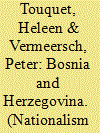

|
|
|
|
|
| Publication |
2008.
|
| Summary/Abstract |
This essay seeks to move beyond the traditional discussions on state change in Bosnia-Herzegovina by assessing the usefulness of shifting attention away from state- and institution-building efforts by domestic or international political elites and by focusing instead on the actions of local nonstate actors. We advocate a theoretical investigation into what might be gained from devoting new scholarly attention to identity-forming processes at the sidelines of governmental politics. We add empirical support to our argument by analyzing the work of a number of organizations in Bosnia that mobilize Bosnian citizens along nonethnic lines and construct alternative state-building narratives
|
|
|
|
|
|
|
|
|
|
|
|
|
|
|
|
| 2 |
ID:
144908
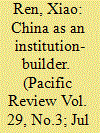

|
|
|
|
|
| Summary/Abstract |
As China is entering into the center stage of the world arena, it has become more proactive in regional and global institution-building. Globally, it has been actively involved in the G20 affairs and will be hosting the 2016 G20 Summit in Hangzhou. Regionally, it came up with a major initiative for a new institution, namely, the Asian Infrastructure Investment Bank (AIIB). This article aims to analyze the new institution's formation, goals and institutional arrangements as well as its implications.
|
|
|
|
|
|
|
|
|
|
|
|
|
|
|
|
| 3 |
ID:
177675
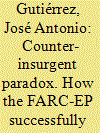

|
|
|
|
|
| Summary/Abstract |
Institutions are historical products shaped by power and contestation which don’t necessarily respond to the purpose for which they were originally created. I will explore how ‘communal action’ institutions created to contain the advancement of the insurgent movement in rural Colombia in the 1950s were eventually used by guerrillas, notably the FARC-EP. Through them, rebels advanced their political agenda, reinforcing their organisational work in rural communities. The strategic impact of this contradictory process, cannot be over-stated, for it turned the struggle of rebels against the State into a struggle fought squarely within the very structures of the State they antagonised.
|
|
|
|
|
|
|
|
|
|
|
|
|
|
|
|
| 4 |
ID:
148308


|
|
|
|
|
| Summary/Abstract |
This study examines conditions under which states in East Asia engage in the development of regional institutions. It assumes that crucial external events and shocks, which produce specific historical breakpoints – critical junctures – constitute a significant breakpoint at which the regional states willingly elevated a path to develop regional institutions to a new level. The analysis of the development of regional institutions for a free trade area and food stock for emergency revealed that regional states in East Asia changed their views on the evolving reality created by external shocks and such changes led to the creation of new regional institutions.
|
|
|
|
|
|
|
|
|
|
|
|
|
|
|
|
| 5 |
ID:
097028
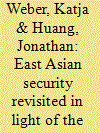

|
|
|
|
|
| Publication |
2010.
|
| Summary/Abstract |
This paper analyzes the relevance of the European integration experience for East Asia's future security architecture. Similar towhat happened in Europe, the paper argues, there may be a need for a cathartic process of remembrance and reconciliation in East Asia to help transcend historical legacies and create a solid foundation for integration. Considering the multi-faceted nature of security threats, moreover, it is hypothesized that the main ingredient of the European success strategy- the institutionalization of trust on multiple levels which, at least in some issue areas, requires the voluntary curtailment of states' autonomy- is likely to be emulated in the long run. A mini case study scrutinizes the essential elements of reconciliation (remembrance, restitution, apology) and shows how they enabled Germany to confront its past successfully, whereas Japanese attempts to transcend historical legacies thus far have fallen short. The paper then sketches several European institutional arrangements since the end of WorldWar II and, comparing them to East Asian security structures, speculates about future security provisions in East Asia.
|
|
|
|
|
|
|
|
|
|
|
|
|
|
|
|
| 6 |
ID:
153930
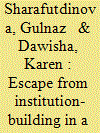

|
|
|
|
|
| Summary/Abstract |
Strong institutions and accountable governments are imperative for any country’s long-term prosperity. Yet the development of such institutions has presented a continuous challenge for many countries around the world. Using Russia as a case, this study brings attention to the unexpected negative impact of global interdependence and shows that institutional arbitrage opportunities have enabled economic actors to solve for institutional weaknesses and constraints in the domestic realm by using foreign institutions, thereby limiting the emergence of a domestic rule of law regime. We argue that such opportunities lower the propensity of asset-holders, normally interested in strong institutions at home, to organize collective action to lobby for better institutions. We demonstrate the main ways through which Russia’s capital-owners make use of foreign legal and financial infrastructures such as capital flight, the use of foreign corporate structures, offshore financial centers, real estate markets, the round-tripping of foreign direct investment, and reliance on foreign law in contract-writing and foreign courts in dispute-resolution.
|
|
|
|
|
|
|
|
|
|
|
|
|
|
|
|
| 7 |
ID:
080871
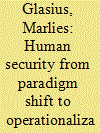

|
|
|
|
|
| Publication |
2008.
|
| Summary/Abstract |
This article shows how human security has functioned as both a paradigm-shifting and a bridging concept, with its most significant implications being, first, the shift from a focus on state security to one on human rights, and, second, the indivisibility of physical and material security. The article will argue that, despite attempts at narrowing and appropriation, human security has lost neither its radical edge nor its holistic character; however, the bulk of the literature on the subject is theoretical, and there has not been a serious enough effort to operationalize the term so as to enable a real shift in policymaking. The second half of the article is an attempt to operationalize human security while respecting its paradigm-shifting and holistic character. It discusses necessary connections with wider policy shifts before outlining ways in which current intelligence, development, military and `state-building' practices would have to be transformed to serve human security. Finally, a sketch is drawn of the ideal `human security worker' of the future and the contexts in which she might work.
|
|
|
|
|
|
|
|
|
|
|
|
|
|
|
|
| 8 |
ID:
160009
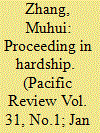

|
|
|
|
|
| Summary/Abstract |
In recent decades, the development of trilateral institutions among China, Japan and South Korea has begun to take shape. This study analyzes its strengths and weaknesses with regard to the nexus between trilateralism and bilateralism. A well-functioning trilateral grouping needs to overcome two structural limitations – dilution effects and bilateral constraints – both of which are triggered by embedded bilateral approaches. The critical juncture approach is effective in terms of elevating the payoffs of cooperative trilateralism during times of exigency. However, once common crises have dissipated, trilateralism has revealed starkly different performances with respect to functional and political-diplomatic cooperation. This article adopts a dichotomous approach between the two. Functional trilateralism has been steadily growing, and has proven to be less subject to fluctuations in the nations’ political relationships. Its outcomes are positive and worthy of praise. However, the outcomes of trilateralism have been less convincing in fields of middle and high politics. Trilateralism is overwhelmingly subject to fluctuations when its embedded bilateral relations change, and cooperative outcomes within a trilateral grouping are prone to being diluted by bilateral approaches. China–Japan–Korea trilateralism at diplomatic levels remains more an extension of bilateral relations than a mature form of minilateral arrangement.
|
|
|
|
|
|
|
|
|
|
|
|
|
|
|
|
| 9 |
ID:
170684
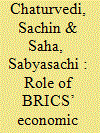

|
|
|
|
|
| Summary/Abstract |
This article attempts to understand BRICS from the perspective of a multi-polar world order and the role played by India at the BRICS. Specifically, the article looks at the implication that BRICS has for future of multilateralism, promoting new institutional delivery mechanisms, upholding the space for development and equity, and highlights India’s contribution to the shaping of the BRICS agenda. The future of BRICS cooperation and scope for deeper collaboration would necessarily evolve out of the priorities of global governance reforms, contribution to global public goods, meaningful economic cooperation, deepening of institution-building efforts and the convergence of the guiding principles.
|
|
|
|
|
|
|
|
|
|
|
|
|
|
|
|
|
|
|
|
|